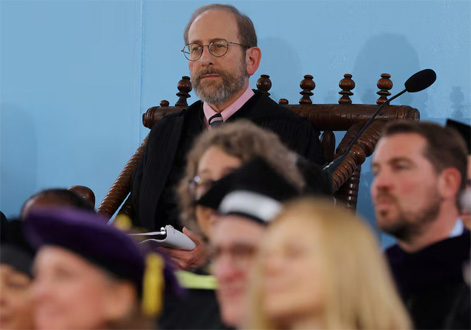|
|
|
|
|
|
 |
|
|
Interim
president
Alan
Garber
attends
the
373rd
Commencement
Exercises
at
Harvard
University
in
Cambridge,
Massachusetts,
U.S.,
May 23,
2024.
REUTERS/Brian
Snyde |
| |
Harvard
faces
$2.3B
funding
freeze,
Trump
administration's
demands
and
crackdown
CAMBRIDGE,
MA - The
clash
between
Harvard
University
and the
Trump
administration
has
intensified,
with the
prestigious
institution
rejecting
demands
that
would
grant
the
government
significant
control
over its
policies
and
operations.
Harvard’s
refusal
led to a
swift
response
from the
administration,
which
froze
$2.3
billion
in
federal
funding,
citing
the
university’s
alleged
failure
to
address
antisemitism
and
uphold
civil
rights
tied to
taxpayer
investments.
This
move is
part of
a
broader
campaign
targeting
universities,
following
pro-Palestinian
protests
and
accusations
of
antisemitism
on
campuses.
Harvard
President
Alan
Garber
publicly
condemned
the
demands,
emphasizing
the
importance
of
academic
independence
and
constitutional
rights.
He
argued
that no
government
should
dictate
what
private
universities
can
teach,
whom
they can
admit
and
hire, or
which
areas of
study
they can
pursue.
Garber
also
highlighted
the
university’s
commitment
to
addressing
antisemitism,
but
firmly
opposed
federal
overreach
that he
believes
threatens
Harvard’s
values
and
autonomy.
The
administration’s
demands
include
auditing
faculty
and
students
to
ensure
viewpoint
diversity,
hiring
and
admitting
individuals
solely
based on
merit,
and
screening
international
students
for
alignment
with
American
values.
Harvard
faculty
have
filed
lawsuits
against
the
federal
government,
challenging
the
legality
of these
actions.
Meanwhile,
the
university
is
borrowing
$750
million
to
mitigate
the
financial
impact
of the
funding
freeze.
Other
institutions,
such as
Columbia
University,
have
faced
similar
scrutiny,
with the
administration
suspending
$400
million
in
federal
funding
and
considering
legal
measures
to
enforce
compliance.
The
broader
crackdown
has
raised
concerns
about
academic
freedom,
free
speech,
and the
independence
of
higher
education
institutions.
Deportation
proceedings
and visa
cancellations
for
foreign
students
involved
in
pro-Palestinian
demonstrations
have
further
escalated
tensions.
Despite
the
challenges,
Harvard
remains
steadfast
in its
stance,
asserting
that it
will not
surrender
its
independence
or
constitutional
rights.
Garber
reiterated
the
university’s
commitment
to
fostering
an
environment
of
learning
and
inquiry,
free
from
external
control.
While
Harvard
has
taken
steps to
address
antisemitism,
it
refuses
to
comply
with
demands
that
undermine
its core
principles.
|
|
|
|
|
|
|
|
|